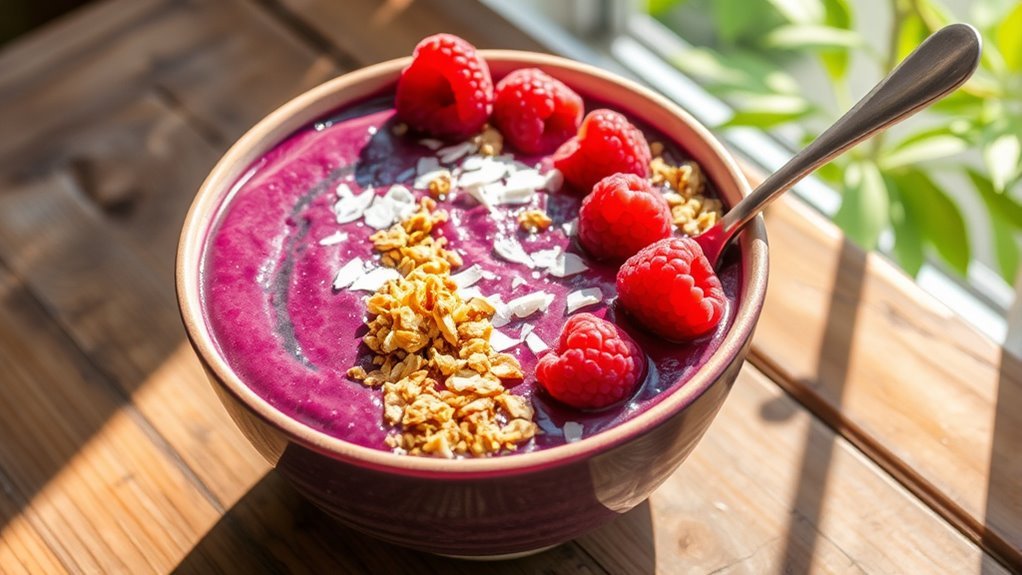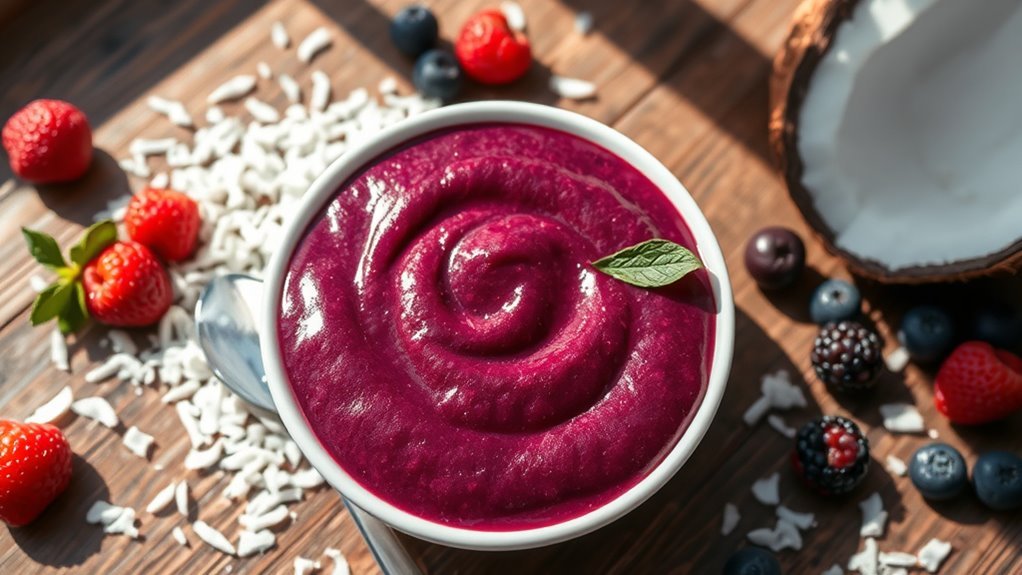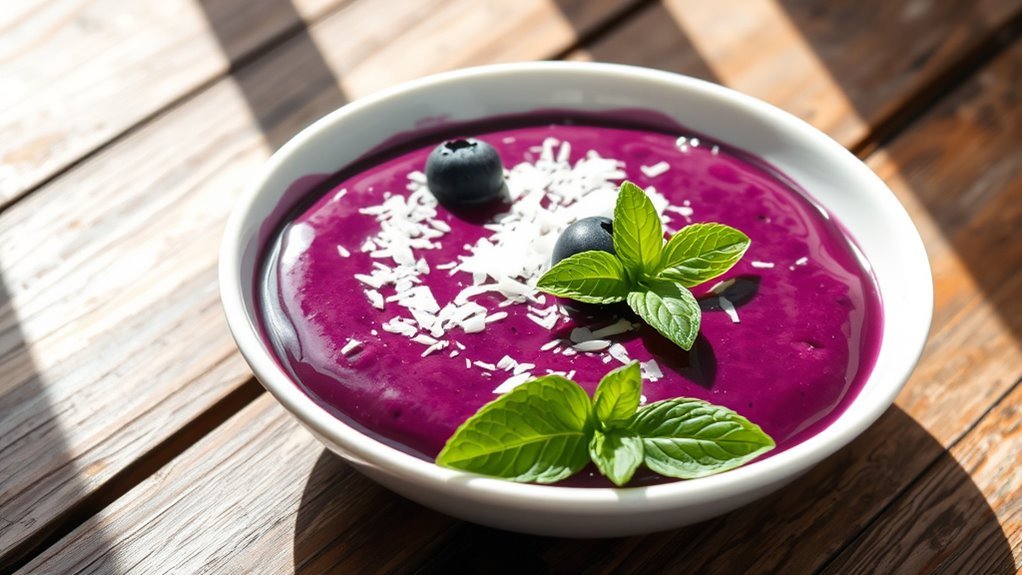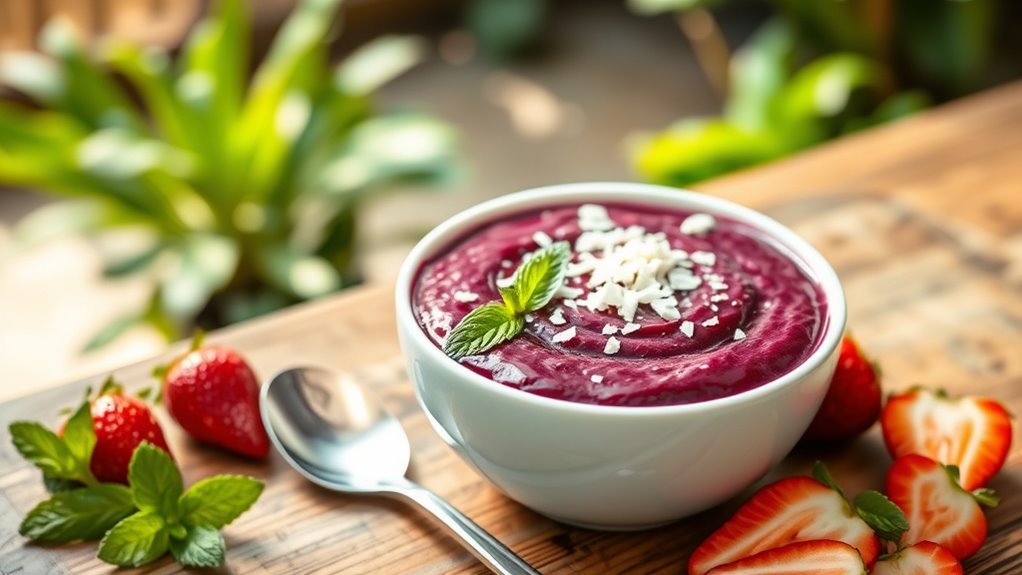Yes, acai can be keto-friendly. A 100-gram serving of unsweetened acai puree contains about 4-5 grams of carbohydrates, making it a low-carb option. However, processed forms might have added sugars, so it’s important to choose pure varieties. Portion control is essential to stay within your carb limits while enjoying its antioxidants and healthy fats. If you want to discover more about incorporating acai into your meals, there are plenty of ways to enjoy it!
Understanding Acai Berries

Acai berries, small purple fruits native to the Amazon rainforest, have gained popularity for their health benefits and unique flavor. Their origins trace back to Brazil, where local communities have harvested them for centuries. You’ll find different acai varieties, mainly the Euterpe oleracea and Euterpe precatoria, each offering distinct flavor profiles and nutrient compositions. These berries grow on tall palm trees and are typically harvested at dawn to preserve their freshness. While often marketed as a superfood, it’s essential to note that the processing methods can impact their nutritional value. Fresh acai is perishable, leading to the production of frozen pulp or powdered forms, widely available in health food stores. Understanding these aspects can help you make informed choices about incorporating acai into your diet.
Nutritional Profile of Acai

Packed with a variety of nutrients, the nutritional profile of acai berries makes them an appealing addition to many diets. These berries are rich in antioxidants, vitamins A and C, and healthy fats, particularly omega-3, omega-6, and omega-9 fatty acids. When considering acai varieties, you’ll find that the nutritional content can vary slightly based on the sourcing methods used. Fresh acai, sourced directly from the Amazon, tends to offer higher nutrient levels compared to processed forms. Additionally, acai is low in sugar, making it suitable for those watching their carbohydrate intake. Incorporating acai into your diet can enhance your overall nutritional intake while providing a unique flavor profile that complements various dishes.
Carbohydrate Content in Acai

When evaluating whether acai fits into a keto diet, understanding its carbohydrate content is important. Acai berries, derived from the acai palm native to the Amazon rainforest, come in various acai varieties, each with differing carbohydrate levels. Generally, a 100-gram serving of unsweetened acai puree contains around 4-5 grams of carbohydrates. This is relatively low compared to many fruits, making acai a more keto-friendly option. However, be cautious with processed acai products, as they often include added sugars, increasing the carb count considerably. If you’re aiming for a ketogenic lifestyle, it’s essential to focus on the purest forms of acai to maintain your carb limits while enjoying its unique flavor and nutritional benefits.
Health Benefits of Acai
Acai berries are known for their impressive nutrient density, packed with vitamins, minerals, and healthy fats. Their high antioxidant content can combat oxidative stress, which is linked to various chronic diseases. Additionally, research suggests that acai may support heart health by improving cholesterol levels and reducing inflammation.
Nutrient Density Overview
While many fruits offer health benefits, few can compete with the remarkable nutrient density of acai berries. These small, dark purple fruits are rich in essential nutrients, including healthy fats, fiber, and vitamins A, C, and E. Their unique composition supports ideal nutrient absorption, which is vital for maintaining a dietary balance. Acai’s high fiber content aids digestion and promotes satiety, making it a valuable addition to your diet. Furthermore, the presence of healthy fats helps your body absorb fat-soluble vitamins, enhancing overall nutrient utilization. Incorporating acai into your meals can help you achieve a more balanced diet, providing you with the freedom to enjoy delicious, healthful food while maximizing the benefits of your nutritional choices.
Antioxidant Properties Explained
The antioxidant properties of acai berries play an essential role in promoting overall health and well-being. Rich in various antioxidant sources, acai berries help combat oxidative stress, which can lead to chronic diseases. Here are three notable health benefits:
- Cell Protection: Antioxidants in acai can neutralize free radicals, protecting your cells from damage.
- Inflammation Reduction: These compounds may help lower inflammation levels, contributing to better overall health.
- Enhanced Immune Function: Regular consumption of acai can support your immune system, helping you fend off illnesses.
Incorporating acai into your diet not only adds flavor but also offers significant health benefits, making it a worthwhile addition for those seeking to enhance their well-being.
Heart Health Benefits
When considering heart health, incorporating acai berries into your diet can offer significant benefits. Research indicates that these nutrient-dense fruits can aid in cholesterol reduction, which is essential for maintaining healthy blood lipid levels. Acai berries are rich in anthocyanins, compounds that may help lower LDL cholesterol, promoting better heart circulation. Improved circulation not only supports overall cardiovascular health but also enhances oxygen and nutrient delivery throughout your body. Additionally, the fiber content in acai can help regulate blood sugar levels, further contributing to heart health. By including acai in your meals or smoothies, you’re taking a proactive step towards optimizing your heart function and enjoying the freedom that comes with enhanced wellness.
How Acai Fits Into a Keto Diet
When considering acai in a keto diet, it’s crucial to examine its nutritional profile, especially its carbohydrate content. You’ll want to analyze how serving sizes affect your daily carb limits, as even small amounts can impact ketosis. Understanding these factors will help you incorporate acai in a way that aligns with your dietary goals.
Nutritional Profile Overview
Acai berries, often hailed for their superfood status, boast a unique nutritional profile that can complement a ketogenic diet. When considering acai sourcing, it’s important to note that not all acai varieties are created equal. Here are three key aspects of acai’s nutritional value:
- Antioxidants: Acai is rich in anthocyanins, which can help combat oxidative stress and may support overall health.
- Healthy Fats: These berries contain omega-3 and omega-6 fatty acids, beneficial for maintaining ketosis.
- Fiber Content: The fiber in acai can aid digestion and help manage appetite, aligning with keto goals.
Incorporating acai into your diet can offer these benefits, provided you choose high-quality sources and varieties that fit your nutritional needs.
Carb Count Analysis
Though many health enthusiasts celebrate acai for its superfood status, careful consideration of its carbohydrate content is essential for those following a ketogenic diet. Typically, a serving of acai puree contains about 14 grams of carbs, which can be quite substantial when you’re aiming for a daily intake of just 20-50 grams. If you’re blending an acai smoothie or preparing acai bowls, the carb count can quickly add up with added fruits or granola. To maintain ketosis, it’s vital to keep your portions in check and be mindful of any additional ingredients. Consider using unsweetened acai products and pairing them with low-carb options like spinach or nut butter to create a keto-friendly treat that satisfies your cravings without derailing your diet.
Serving Size Recommendations
While enjoying acai as part of a ketogenic diet, understanding appropriate serving sizes is essential for maintaining your carb limits. Acai can be keto-friendly, but portion control is key to keeping your carbohydrate intake in check. Here are some serving size recommendations:
- Frozen Acai Pulp: Stick to about 100 grams (3.5 ounces) to keep carbs low.
- Acai Bowls: If you’re blending, limit toppings like granola or honey, and aim for a bowl with no more than 200 calories from acai.
- Acai Powder: Use 1-2 tablespoons (10-20 grams) in smoothies, ensuring it fits within your daily carb goals.
Tips for Incorporating Acai Into Your Meals
If you’re looking to add a nutritious twist to your meals, incorporating acai could be a great option. You can start your day with an acai smoothie, blending frozen acai puree with unsweetened almond milk, spinach, and a scoop of protein powder for a filling breakfast. If you’re in the mood for something more substantial, try an acai bowl topped with your favorite nuts, seeds, and a drizzle of nut butter. This not only enhances flavor but also adds healthy fats. You can also mix acai into yogurt or oatmeal for a vibrant snack. Just remember to keep portion sizes in mind to maintain your keto goals while enjoying the rich taste and health benefits of acai.
Alternatives to Acai for Keto Dieters
Are you searching for keto-friendly alternatives to acai? You’re in luck! There are plenty of low carb fruits and keto snacks that can satisfy your cravings while keeping you on track. Consider these options:
- Berries: Strawberries, raspberries, and blackberries are low in carbs and high in antioxidants, making them excellent choices for your keto diet.
- Avocado: Packed with healthy fats and fiber, avocado can be a versatile addition to smoothies or salads.
- Coconut: Whether you choose shredded, flaked, or as coconut milk, it’s low in carbs and adds a rich flavor to your dishes.
These alternatives can help you maintain your keto lifestyle without sacrificing taste or nutrition. Enjoy the freedom to explore these delicious options!
Frequently Asked Questions
Can I Consume Acai if I’m Allergic to Berries?
If you’re allergic to berries, it’s best to avoid acai, as it’s a berry itself. Consuming it could trigger an allergic reaction, which can be serious. Instead, consider acai alternatives like coconut or chia seeds, which offer similar health benefits without the risk of allergy. Always consult with a healthcare professional before trying new foods, especially if you have known allergies. Your health and safety should be your top priority!
Is Acai Available in Powdered Form?
Yes, acai is available in powdered form, making it convenient for you to incorporate it into your diet. This powdered version retains many acai benefits, such as antioxidants and healthy fats. You can easily add it to smoothies or oatmeal, or use it in various acai recipes. Just be sure to check the label for added sugars, as they can negate some health advantages. Enjoy exploring different ways to boost your meals with acai!
How Should I Store Acai Products?
When it comes to acai storage, think of it as preserving a fleeting sunset. To maintain its vibrant flavor and nutrients, freeze acai products right after opening. If you’ve got frozen acai, keep it in an airtight container to avoid freezer burn. Always check the expiration date, and once thawed, consume it quickly to savor its essence. This way, you’ll enjoy the rich benefits of acai while ensuring it remains fresh and potent.
Can Acai Help With Weight Loss?
Acai berries have gained attention for their potential benefits in weight loss. They’re rich in antioxidants and can help boost metabolism, which might assist in shedding pounds. Additionally, acai’s fiber content can promote feelings of fullness, reducing overall calorie intake. However, it’s important to remember that no single food guarantees weight loss. Combining acai with a balanced diet and regular exercise is the best approach for achieving your weight loss goals.
Are There Any Side Effects of Consuming Acai?
When considering acai, it’s important to know about any potential side effects. Generally, acai’s benefits include rich antioxidants and potential weight loss support, but excessive consumption could lead to digestive issues, like diarrhea. It’s recommended to stick to a moderate acai dosage, usually around 100-200 grams of puree per day, to minimize risks. Always consult a healthcare professional if you have specific concerns or underlying health conditions before adding acai to your diet.
Frequently Asked Questions about Acai and the Keto Diet
1. Is acai berry low in carbohydrates?
Yes, acai berries are relatively low in carbohydrates compared to many other fruits. A typical serving of acai puree contains about 4-5 grams of carbohydrates. However, when considering a keto diet, it’s important to factor in the total carbohydrates consumed throughout the day, as the ketogenic diet typically restricts daily carb intake to around 20-50 grams.
2. Can I include acai in my keto meal plan?
Yes, you can include acai in your keto meal plan, but moderation is key. Due to its low carbohydrate content, acai can fit into a keto diet if consumed in small portions. It’s best to avoid acai bowls that are laden with sweeteners, granola, and high-carb toppings, as these can quickly increase the carbohydrate count.
3. Are there any health benefits of acai berries on a keto diet?
Acai berries are rich in antioxidants, particularly anthocyanins, which can help combat oxidative stress. They also provide healthy fats and fiber, which can support digestive health. For those on a keto diet, the antioxidants in acai may help mitigate some of the inflammation that can arise from a high-fat diet, promoting overall well-being.
4. What form of acai is best for a keto diet?
The best form of acai for a keto diet is unsweetened acai puree or frozen acai berries. These options contain minimal added sugars and can be blended into smoothies or used as a base for desserts. Avoid acai powders and products that contain added sweeteners, as these can increase the carbohydrate content and may not align with keto guidelines.
5. How should I incorporate acai into a keto-friendly recipe?
You can incorporate acai into keto-friendly recipes by creating a smoothie bowl. Use unsweetened acai puree as the base, add a low-carb milk like almond milk, and blend in some spinach or avocado for creaminess. Top with keto-friendly toppings such as nuts, seeds, or unsweetened coconut flakes for added texture without exceeding your carb limits.
References
- https://www.ncbi.nlm.nih.gov/pmc/articles/PMC5483473/
- https://www.healthline.com/nutrition/acai-berry-benefits
- https://www.webmd.com/diet/obesity/acai-berry-benefits
- https://www.researchgate.net/publication/329672758_Acai_Berry_The_Health_Benefits_of_a_Tropical_Fruit
- https://www.ncbi.nlm.nih.gov/pmc/articles/PMC3645072/
- https://www.wisewell.com/blogs/news/is-acai-keto-friendly
- https://www.cdc.gov/healthyweight/healthy_eating/index.html


